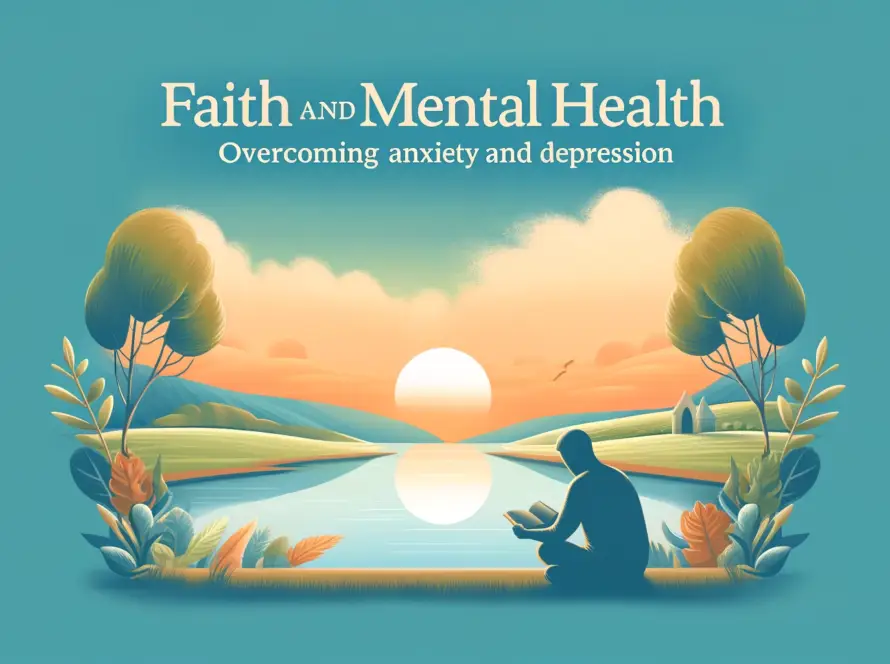Anxiety and stress can seem like old but unwelcome acquaintances in an uncertain surroundings. One might quickly get terrified by global disasters and personal pain as well as from financial crises and pandemics. The Bible promises us believers that God is constantly with them, thereby offering hope, serenity, and bravery to enable them to go past their fears.
Let us search for ways to get beyond anxiety and dread in hard conditions using Biblical concepts that reveal of God’s fidelity, presence, and strength.
Handling Fear and Anxiety
When faced with doubt or expected dangers, people naturally get scared and nervous. Whatever their small scale, worries about health, money, or the state of the world can gradually saps our soul.
These things happen, but we shouldn’t let them define our life. The apostle Paul tells us, in 2 Timothy 1:7, “For God has not given us a spirit of fear, but of power and of a sound mind.” This chapter makes rather clear that our anxiety is not derived from God. Instead we are enabled, loved, and given the mental clarity to openly face fear.
Biblical Strategies for Overcoming Fear and Anxiety
- Confidence in God’s Sovereignty
Remembering that God is in charge helps one to overcome fear. Though everything looks random, nothing exists aside from God’s knowledge and force. Proverbs 3.5–6 urge us, “Trust in the Lord with all your heart and lean not on your own understanding; in all your ways submit to Him, and He will make your paths straight.”
Believing in God’s power releases us from the need to govern or dominate all. Believing that God molds the future helps us to find peace even in the most trying conditions.
- Hand God Your Anxiety
Praying is among the finest ways to overcome fears and concerns. Paul counsels us in Philippians 4:6–7 not to worry about anything but rather to pray and thank God for all we need in all circumstances. Christ Jesus will defend your thoughts and hearts from the peace of God, which spans all understanding.
Turning to prayer enables us to ground our growing worries at God’s feet. By doing this, we free our hearts and minds for God’s peace. Though “anxiety was great within me,” the poet adds in Psalm 94:19 “your consolation brought me joy.”
- Find God’s promises
Many promises in God’s Word relate to His provision, concern, and safety. Considering these promises enables us to turn our attention from our doubts about God’s commitment. Consider these conscientious pledges:
Isaiah 41:10, the pertinent chapter, You should not be afraid therefore since I am your God and I am here among you. Using my holy right hand, I will serve you, help you, and empower you.
Psalm 47: 1–2 God is constantly with us; he is a safe haven and a strength source. We shall so not be afraid even if the ground collapses and the mountains drop into the sea.
We can let the truth of God to wipe our fears and replace confidence in His perfect love as we honor these songs and reflect upon them.
- Involve an encouraging community
We were never meant to individually negotiate the rigours of life. When you’re miserable and confused, finding solace in a loving religious group might be really helpful. Hebrews 10:24–25 calls us to “let us consider how we may spur one another on toward love and good deeds, not giving up meeting together… but encouraging one another.”
Should you feel yourself overwhelmed, look for trustworthy persons who can pray with you and offer godly direction—that of mentors, small group members, or friends. Strength derived from God will enable you to motivate one another in his fidelity.
- Keep grounded in the here and now.
Future worries, that is, those regarding what might happen or go wrong, are common causes of worry and panic. Jesus exhorts us, though, to believe God for the future and to live right now. ” Therefore do not worry about tomorrow,” counsels Matthew 6:34 for the future looks after itself. There are sufficient challenges every day.
Emphasizing the here and now allows us to control present problems without letting future dread define our conduct. It also allows us observe and appreciate the ways God is now meeting our needs.
Easy Techniques for Overcoming Arachnophobia and Anxiety
Apart from these biblical principles, there are sensible strategies to manage fear and anxiety in daily life. These little activities could be quite helpful:
- Should your anxiety begin to rise, stop and several times inhale deeply. This enables your nervous system to calm by reminding you of the present.
- Minimise Your Negative News Interaction. Though education is vital, continuously reading negative news could be somewhat upsetting. Reduce your news consumption and replace inspirational or positive stories for it.
- Maintaining a diary in which you record your thanks for daily tiny happenings will assist you to grow in gratitude. By means of gratitude, you can focus on the ways God is guiding and supporting you instead of on what is wrong.
- Lead a busy life; regular exercise is a great way to help you relax. Run, walk, or another type of physical exercise helps you slow down your rushing ideas and muscles.
In an uncertain world, we must choose whether to give in to fear or remain steadfastly in the hope and peace God offers. Not a spirit of anxiety, God has given us power, love, and a sound mind as 2 Timothy 1:7 reminds us. His resilience lets us openly and confidently negotiate uncertain events.
Know that God is with you and will provide the peace and direction you need independent of your circumstances—health, money, or world events. Overcoming fear and anxiety will come by depending on your community, praying for His direction, considering His promises, and trusting His sovereignty. God perfectly determines your path.
Psalm 56:3: “When I am afraid, I put my trust in You.” As you negotiate erratic circumstances. God’s love and care will enable you to directly face your anxieties and fears since they are always kind and caring.


